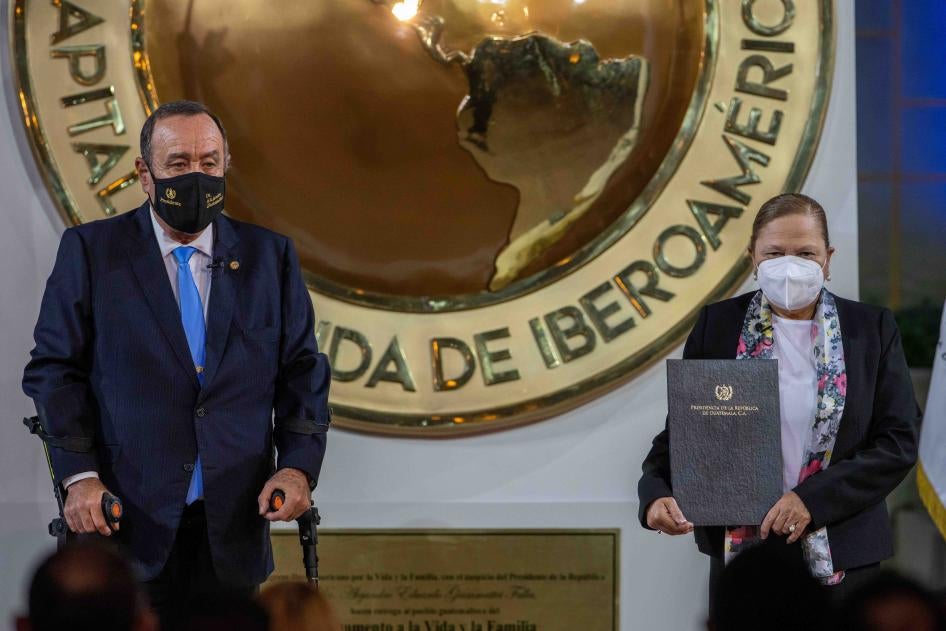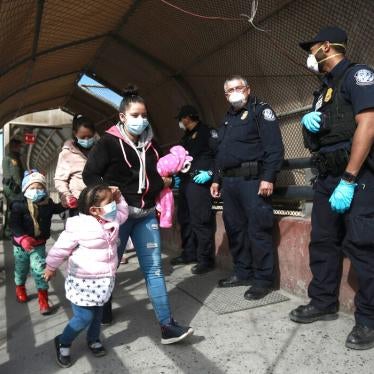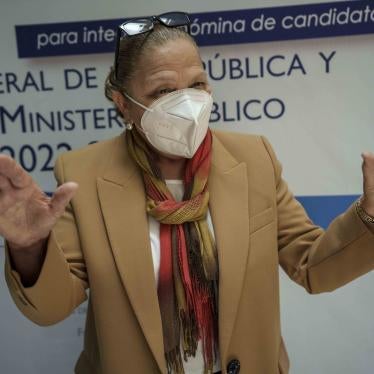(New York) – Guatemalan President Alejandro Giammattei’s decision to reappoint Consuelo Porras as attorney general poses a serious risk to human rights and the rule of law in the country, Human Rights Watch said today. Concerned governments should immediately condemn the move and sanction individuals, including from the private sector, who are undermining the rule of law in Guatemala.
President Giammattei announced his reappointment of Porras on May 16, 2022, to serve for another four years. During her initial four years in office, Porras has undermined investigations into corruption and human rights abuses, and brought arbitrary criminal proceedings against journalists, judges, and prosecutors.
“Porras’ reappointment could be a fatal blow to the rule of law and the fight against corruption in Guatemala,” said Tamara Taraciuk Broner, acting Americas director at Human Rights Watch. “Concerned governments, including from the United States, Europe, and Latin America, should urgently increase their scrutiny and take robust action to protect Guatemala’s democratic institutions.”
The appointment process, which began in January, was marred by several attempts by government authorities and the Foundation against Terrorism (Fundación contra el Terrorismo), a right-wing nongovernmental organization that supported Porras’ re-election, to undermine its fairness, including their efforts to erode the nominating commission’s independence.
On April 22, the nominating commission presented its short list of six candidates to President Giammattei.
In an initial review of her record, the commission gave Porras high marks, but commissioners later received and analyzed allegations that she had plagiarized her doctoral thesis, as well as concerns about her actions undermining corruption investigations. As a result, in multiple rounds of voting, she did not receive sufficient votes to be nominated. However, the Constitutional Court on April 22 ordered the commissioners “immediately” to submit a list reflecting “meritocratic criteria,” which appears to have led members of the commission to change their votes to include Porras, despite the many concerns about her qualifications.
Human Rights Watch traveled to Guatemala in January to examine the work of the Attorney General’s Office under Porras. Human Rights Watch interviewed 45 people, some by phone before and after the visit. They included 13 former or current prosecutors and 6 former or current judges, as well as several journalists, human rights defenders, and victims’ lawyers. To investigate specific cases during Porras’ tenure, Human Rights Watch also reviewed criminal files and other judicial documents. Attorney General Porras did not respond to a request for information.
Human Rights Watch documented Porras’ transfer, firing, or, in some cases, arbitrary criminal investigations of independent prosecutors who were leading investigations or prosecutions of corruption and human rights violations.
The cases included the firing of Juan Francisco Sandoval, head of the Special Prosecutor’s Office against Impunity (Fiscalía Especial contra la Impunidad, FECI), and the transfers of Stuardo Campos, former head of the Attorney General Office’s anti-corruption unit, and Hilda Pineda, head of the Attorney General Office’s human rights unit.
Prosecutors and lawyers with knowledge of the cases told Human Rights Watch that such transfers slowed investigations into human rights violations and high-level corruption scandals. Prosecutors said the fear of being transferred, the removal in some cases of measures to protect their security, and requirements for Porras’ inner circle to endorse their decisions interfered with their work.
Under Porras, the Attorney General’s Office promoted spurious criminal proceedings against independent judges, prosecutors, and journalists. Victims of seemingly abusive prosecutions have included, among others:
- Erika Aifán, a judge who had ruled on high-level corruption cases, including one on alleged bribes paid by the Brazilian construction firm Odebrecht. In January 2022, the Attorney General’s Office twice requested that she be investigated – and stripped of her immunity – for investigating allegations of corruption without authorization from the Supreme Court, as required by Guatemalan law.
Aifán told Human Rights Watch she had merged the cases with an existing investigation assigned to her by the Supreme Court because it involved the same defendants and a related crime. Challenges to such mergers would normally be handled through a jurisdiction complaint, not a criminal investigation. Aifán fled Guatemala and resigned in March. - Juan Francisco Sandoval, the widely respected head of FECI, a unit charged with investigating high-impact cases originally handled by the United Nations-backed International Commission Against Impunity in Guatemala (CICIG), which a former president had disbanded.
The Attorney General’s Office has issued two arrest warrants for Sandoval since Porras removed him in July 2021, one, in September, for “obstructing criminal proceedings” and another, in November, for “abuse of authority,” “usurpation of functions,” “fraud,” and “conspiracy.” Case files are confidential. Since his firing, Sandoval has spoken out about Porras’ efforts to obstruct criminal investigations. He now lives in the United States. - Siomara Sosa, a former FECI prosecutor, and Leily Santizo, a former CICIG official, who was Sosa’s lawyer. The two were arrested in February on charges of obstructing justice in the Odebrecht case by requesting that a complaint against Sosa for alleged anomalies in the investigation of the Odebrecht case be added to an ongoing investigation by Judge Aifán.
Guatemalan law authorizes combining cases when crimes are related. Nonetheless, on March 7, after Santizo and Sosa had spent almost a month in prison, a judge determined that they should be investigated for “collusion” with Judge Aifán, and transferred them to house arrest. - Virginia Laparra, the top FECI prosecutor in Quetzaltenango. Laparra was arrested on February 24, when the Attorney General’s Office under Porras re-opened a 2018 investigation of a complaint by Judge Lesther Castellanos, who accused Laparra of “perjury.” Laparra had filed a disciplinary complaint saying Castellanos had unlawfully leaked information from a criminal case.
The Attorney General’s Office said Laparra had committed “perjury,” “abuse of power,” and “usurpation of functions” because she did not have a legal mandate to file disciplinary complaints. Laparra, who has filed requests for her release on health grounds, remains in pretrial detention. - Juan Luis Font, a journalist. Alejandro Sinibaldi, a former infrastructure minister who is under investigation for taking bribes, accused Font of receiving money to refrain from criticizing Sinibaldi in his articles. Several articles in El Periódico, an outlet directed by Font at the time, and Contrapoder, a magazine founded by Font, had reported that people working for Sinibaldi received a million dollars in bribes from several construction companies. The Attorney General’s Office enabled the seemingly spurious investigation of Font and asked a judge to forbid him from leaving the country.
Attorney General Porras has taken Guatemala several steps back in the fight against corruption and in efforts to ensure accountability for human rights violations, Human Rights Watch said. In previous years, investigations by the CICIG and the Attorney General’s Office had exposed corruption schemes in all three branches of government, but the administration of former President Jimmy Morales shuttered the CICIG in 2018.
In September 2021, the United States included Porras – and her assistant Ángel Pineda – in its Undemocratic and Corrupt Actors List, popularly known as the “Engel list,” saying that they had “obstructed investigations into acts of corruption by interfering with criminal investigations.”
After her reappointment, the US designated her and her husband, Gilberto de Jesus Porres de Paz, ineligible for entry into the country for “involvement in significant corruption.” The European Uunion spokesperson for foreign affairs and security policy said her reappointment “raises concerns about the commitment of the Guatemalan authorities to tackle corruption and safeguard the independence of the judiciary.”
The US, European countries, and others should expand sanctions against people, including businesspeople, who are actively engaged in efforts to undermine the Attorney General’s Office’s independence and to dismantle the rule of law, Human Rights Watch said.









